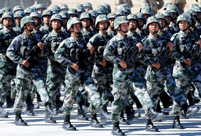 YOG kicks off in Nanjing
YOG kicks off in Nanjing
 Colorful life at Youth Olympic Village of Nanjing 2014 YOG
Colorful life at Youth Olympic Village of Nanjing 2014 YOG
 Royal Taoist temple to open to public
Royal Taoist temple to open to public
 Female soldiers at quake-hit area
Female soldiers at quake-hit area
 Shocking photos of cruel battles in Ukraine
Shocking photos of cruel battles in Ukraine
 Amphibious armored vehicle unit conducts open sea drill
Amphibious armored vehicle unit conducts open sea drill
 Water relay in Henan
Water relay in Henan
 Ethnic culture feasts eyes of travelers
Ethnic culture feasts eyes of travelers
 80 security dogs assembled in Nanjing police dog training base
80 security dogs assembled in Nanjing police dog training base
 Graffiti artists paint on street walls in Xinjiang
Graffiti artists paint on street walls in Xinjiang
BEIJING, Aug. 27 -- China and Brazil face the task of refocusing their trade with each other onto more sophisticated products and investment as the two major emerging economies modernize their industrial structure and their demand for natural resources slows.
China has been Brazil's largest trade partner since 2009 and Brazil is China's ninth largest trade partner worldwide and the largest in Latin America. However, the growth of bilateral trade is slowing down.
In the first half of this year, export and import of goods between the two countries increased 7 percent year on year, a sharp drop from the 43.6-percent growth in the same period three years ago.
Sun Yanfeng, a researcher with the China Institutes of Contemporary International Relations, attributed the cool-down mainly to the effect of economic restructuring in China.
"China is gradually eliminating energy-intensive industries and moderating the speed of its economic growth. This has translated into declining demand for Brazilian natural resources," Sun said.
Trade between the two countries has long been concentrated on raw materials.
In the first six months of 2014, mineral and plant products accounted for 86.5 percent of Brazil's exports to China.
Although the pace of growth in bilateral trade is expected to continue dropping, Sun sees opportunities for Chinese and Brazilian authorities to place more attention on the added value of their products and exploring new fields of trade.
Take iron ore as an example. "China's demand for raw iron ore will decline with the shrinking of its energy-intensive industries, but it will need more of the processed iron ore products that Brazil can export," said Sun.
China's decreasing demand for natural resources also comes at a time when Brazil is looking to move away from resource-centered industries, noted Zhou Zhiwei, a researcher with the Chinese Academy of Social Sciences.
Meanwhile, economic ties between the two economies could go far beyond simple trade to include more joint ventures and investment, with Brazil craving Chinese funding of building projects. Chinese companies' relative wealth can help compensate for the shortage of funding in Brazil.
Brazil's economic transformation is centered around modernizing its industry and encouraging investment and construction of infrastructure. "These are just the areas where China has accumulated a lot of experience," said Zhou.
Sun stressed that trade alone is not enough to push forward the two countries' economic ties. "What is more important is cooperation in investment, financing and joint contracting, which could become the new engines for the economic ties."
Over the past year, the Brazilian government has announced plans for a slew of infrastructure projects, including the extension of airports and ports, the building of 11,000 km of railway and 7,000 km of highway.
During Chinese President Xi Jinping's visit to Brazil in July, Brazilian President Dilma Rousseff welcomed broader investment in his country by Chinese enterprises, particularly highlighting transportation, infrastructure, agriculture, information, logistics and innovation in science and technology.
 Special holidays
Special holidays World's top 10 fighters
World's top 10 fighters 'Stewardesses' serve in hospital
'Stewardesses' serve in hospital Beautiful night scenery of Nanjing
Beautiful night scenery of Nanjing ‘Peace Mission -2014’ joint anti-terror military exercise kicks off in China
‘Peace Mission -2014’ joint anti-terror military exercise kicks off in China Eye-catching guides at the opening ceremony of YOG in Nanjing
Eye-catching guides at the opening ceremony of YOG in Nanjing A female missile launch company of PLA
A female missile launch company of PLA China, the U.S., Britain and the Soviet Union call for Japan's unconditional surrender
China, the U.S., Britain and the Soviet Union call for Japan's unconditional surrender The biggest duty-free store of the world
The biggest duty-free store of the world Volunteers bid farewell to YOG
Volunteers bid farewell to YOG More police dogs join anti-terror campaign in Inner Mongolia
More police dogs join anti-terror campaign in Inner Mongolia Picturesque Dayilan Manchu village in NE China
Picturesque Dayilan Manchu village in NE China Athletes experience the charm of Chinese traditional opera in Nanjing
Athletes experience the charm of Chinese traditional opera in Nanjing Contestants for Miss Bikini World experience Chinese traditional culture
Contestants for Miss Bikini World experience Chinese traditional cultureDay|Week|Month